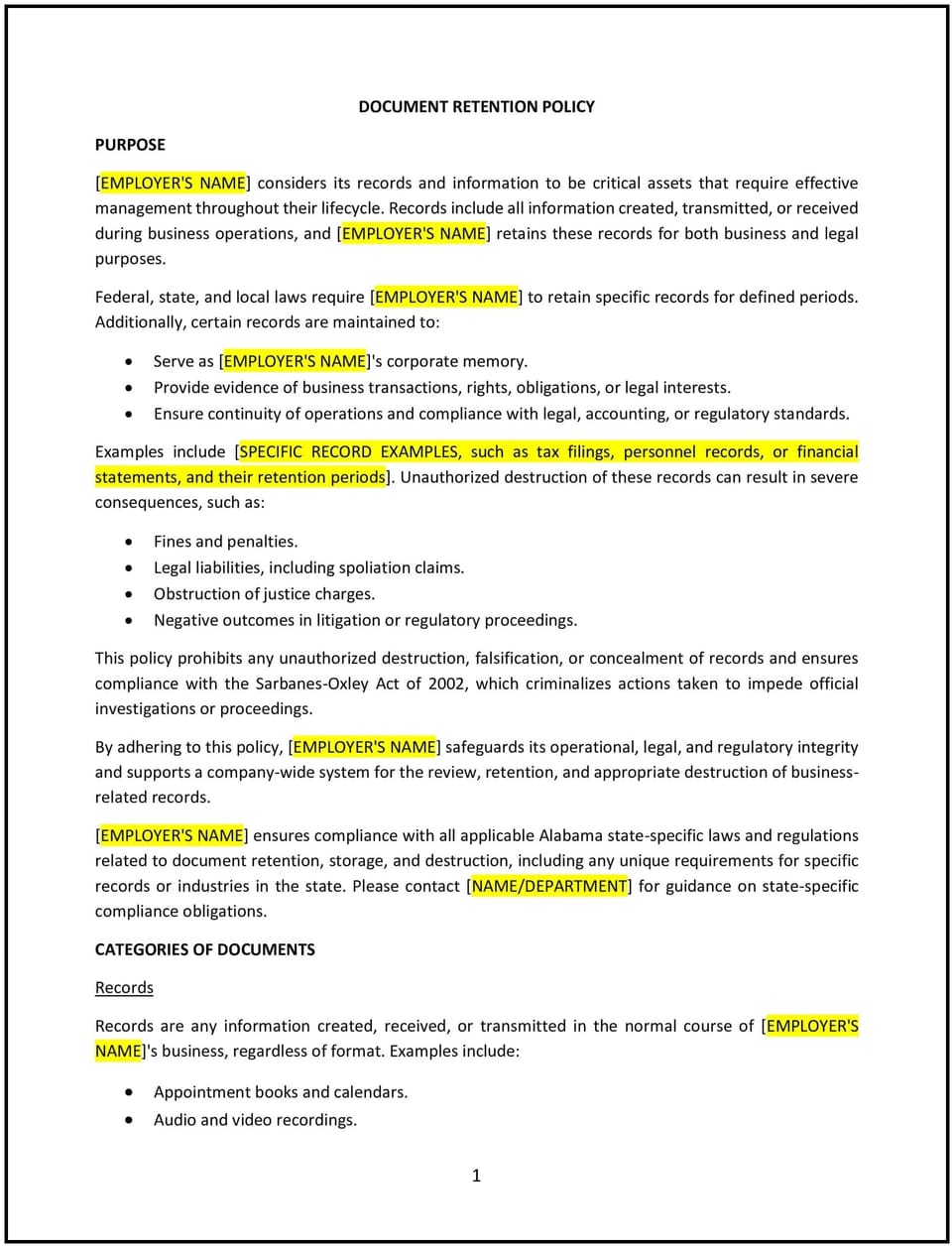Document retention policy (Alabama): Free template

Document retention policy (Alabama)
A document retention policy establishes guidelines for managing and storing business records in compliance with legal, operational, and regulatory requirements. For SMBs in Alabama, this policy ensures that documents are retained for the appropriate timeframes, reducing risks of non-compliance or loss of critical information. By implementing a tailored document retention policy, your business can streamline record-keeping processes and protect sensitive data.
This policy provides clarity on what documents should be retained, for how long, and the procedures for secure disposal when retention periods expire.
How to use this document retention policy (Alabama)
- Identify applicable regulations: Ensure the policy aligns with Alabama state laws and federal regulations governing document retention, such as tax, employment, and corporate governance requirements.
- Define document categories: Clearly specify the types of records covered by the policy, such as financial records, contracts, employee files, and customer agreements.
- Set retention schedules: Establish retention periods for each category of documents based on legal and operational requirements. For example, tax records may need to be retained for seven years, while contracts may require different retention periods depending on their terms.
- Develop secure storage methods: Outline procedures for storing physical and digital documents securely to prevent unauthorized access, loss, or damage.
- Establish disposal protocols: Provide clear steps for securely disposing of documents that are no longer required, such as shredding physical records or permanently deleting digital files.
Benefits of using a document retention policy (Alabama)
A comprehensive document retention policy helps your business manage records effectively and stay compliant. Here’s how it benefits your organization:
- Ensures legal compliance: Helps your business meet Alabama and federal legal requirements for document retention, avoiding fines or penalties.
- Improves efficiency: Streamlines record-keeping processes, making it easier to locate critical documents when needed.
- Reduces storage costs: Eliminates unnecessary document storage by disposing of outdated records systematically.
- Protects sensitive information: Mitigates risks of data breaches by ensuring secure storage and proper disposal of sensitive documents.
- Enhances disaster recovery: Supports continuity planning by ensuring critical documents are preserved and accessible in the event of a disaster or system failure.
Tips for implementing a document retention policy (Alabama)
- Tailor retention periods: Customize retention schedules based on your industry’s regulatory requirements and business needs. For example, healthcare records may require longer retention periods due to patient confidentiality laws.
- Use technology for organization: Implement document management software to track retention periods and automate secure disposal processes for digital records.
- Train employees: Provide training on the importance of document retention, how to categorize records, and the procedures for secure storage and disposal.
- Include exceptions for litigation: Specify that documents relevant to ongoing or potential litigation must be retained until the case is resolved, regardless of standard retention periods.
- Conduct regular audits: Periodically review the document retention process to ensure compliance with legal requirements and improve efficiency.
Q: What types of documents are covered by this policy?
A: This policy applies to a wide range of records, including financial statements, contracts, employee files, tax records, and customer agreements.
Q: How long should tax records be retained in Alabama?
A: Tax records should generally be retained for seven years, but specific requirements may vary depending on the type of tax and the governing regulations.
Q: Can digital records replace physical copies?
A: Yes, digital records can often replace physical copies if they are stored securely and comply with Alabama’s and federal laws on electronic record-keeping.
Q: What happens if documents are disposed of too early?
A: Premature disposal of documents could result in legal or financial consequences, such as failing to provide required documentation during an audit or litigation.
Q: How do I securely dispose of sensitive records?
A: Secure disposal methods include shredding physical documents, permanently deleting digital files, and ensuring that any storage devices are wiped clean before disposal.
Q: Do retention periods apply to email communications?
A: Yes, emails that constitute business records, such as contractual agreements or policy approvals, should be retained according to the relevant retention schedule.
This article contains general legal information and does not contain legal advice. Cobrief is not a law firm or a substitute for an attorney or law firm. The law is complex and changes often. For legal advice, please ask a lawyer.


